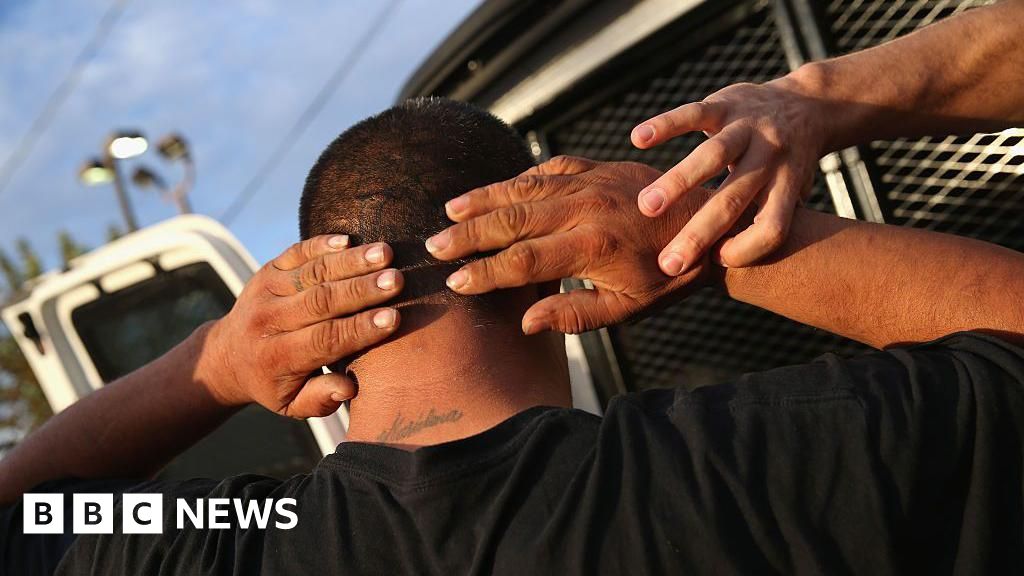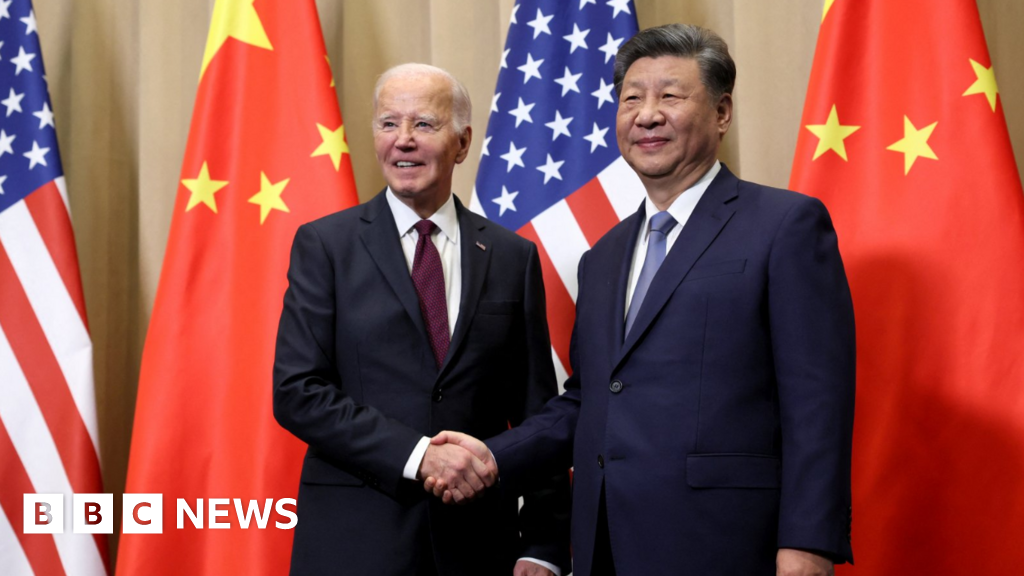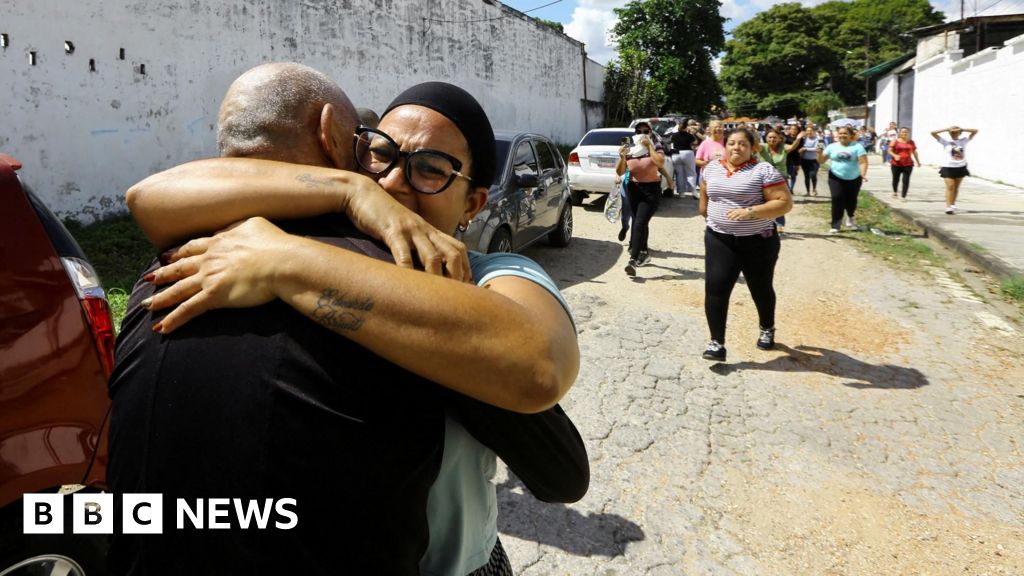ARTICLE AD BOX
By Jeremy Bowen
BBC News, Sarajevo, Bosnia
A welcome sign greets visitors on a bridge in Sarajevo
On a sunlit winter afternoon, it is easy to imagine how life can be good in Bosnia. The pitched roofs of houses on the steep slopes of Sarajevo's valley look like stacks of snow-covered cuckoo clocks. Children skate on an outdoor rink at one of the venues built for the Winter Olympics of 1984.
In the terrible war years between 1992 and 1995, when Sarajevo was besieged by the Bosnian Serb Army, I saw how bad, brutal, and short life could be here too. Bosnia-Herzegovina experienced bloodshed, cruelty and suffering that no-one had seen in Europe since World War Two.
The worst single atrocity happened in Srebrenica in the east, where Bosnian Serb soldiers killed more than 8,000 Bosniak Muslim men and boys over a few days in July 1995. Bosnian Serb wartime leaders Radovan Karadzic and Ratko Mladic are both serving life sentences for genocide and crimes against humanity.
Image source, Fred Scott/BBC
Image caption,Ratko Mladic may be in jail but his legacy remains
Perhaps that should have been the end of it. The war ended in 1995 with an agreement thrashed out at a US Air Force base in Dayton, Ohio. It froze the conflict rather than settled it.
A big force of peacekeepers, and a High Representative with powers to pass laws made sure the deal stuck, but the world moved on some time ago.
The problem for Bosnia is that it did not.
On 9 January a parade in Banja Luka, the de facto Serb capital, brought Bosnia's problems into sharp focus.
Paramilitary police marched through the streets to commemorate the 30th anniversary of the declaration of Bosnian Serb independence in 1992, as Yugoslavia was breaking up and Bosnia was tumbling towards all-out war.
Image source, Press Eye
Image caption,Bosnian Serb police marked their national holiday last month
Presiding over the parade was Milorad Dodik, welcomed by the Americans after the war as a "breath of fresh air", but now seen as a Serb strongman who does not hesitate to raise the ghosts of the past.
One of his close allies is Hungarian Prime Minister Viktor Orban. Mr Dodik emulates aspects of Mr Orban's right-wing nationalism.
Image source, Reuters
Image caption,Milorad Dodik was sanctioned last month by the US for trying to dismantle the Dayton accords
The Serb parade demonstrated the instability inherent in Bosnia-Herzegovina's split personality.
The Dayton agreement divided the country into two entities, with a layer of national institutions, including a joint presidency.
With some adjustments, the border between them follows the front lines at the time the fighting stopped. The Serb entity is called Republika Srpksa. The other, the Federation of Bosnia and Herzegovina, is run by Bosniak Muslims and Croats.
Relations between the two entities have never been easy, but they turned critical last July when the outgoing High Representative, Valentin Inzko, an Austrian with roots in former Yugoslavia, banned the denial of genocide.
The fact a foreigner can pass laws irritates many Bosnians, but the measure outraged the Bosnian Serb leader. He ramped up separatist rhetoric and stopped co-operating with national institutions, of which he is part as the Serb member of the presidential troika.
The current High Representative, Christian Schmidt, a former German minister, said Bosnia was gripped by the "greatest existential crisis of the post-war period". He said a threat by Dodik to turn his armed police into a revived Bosnian Serb army risked the prospect of a return to war.
The British Ambassador to Bosnia, Matt Field, echoed condemnation of Mr Dodik's manoeuvres, which he said were using hate speech and ignoring Bosnia's laws to devastate security and prosperity.
In the first week of 2022 Mr Dodik was sanctioned by the United States for "destabilising corrupt activities and attempts to dismantle the Dayton peace accords".
Four days later he answered his critics by marching his men through the streets of Banja Luka. He turned down our requests for an interview.
Mr Dodik has critics at home as well as abroad. One of the most vocal in the Bosnian Serb opposition is Vojin Mijatovic, vice-president of the Social Democratic Party, who accuses him of fuelling criminality and corruption.
"This is the only way that he's planning to cover millions of millions which he took from criminal corruption activities in Bosnia… I think it's the only way [for him] to survive. That's why I think he's ready to do something."
Genocide denial is a powerful issue in Bosnia. The killings at Srebrenica are exhaustively documented but many Serbs believe that the accusation is unjust.
I met disabled Bosnian Serb ex-servicemen in Banja Luka who declared their loyalty to their former commander, the convicted war criminal Ratko Mladic, and claimed that Serbs were also victims.
A political ally of Mr Dodik, Ljubisa Cosic, the mayor of East Sarajevo, a suburb of the city that lies within Republika Srpksa, accepted that Serbs killed Bosniaks in Srebrenica, but insisted it was not genocide.
"As a sovereign nation, we know what genocide is and we had it in in the Second World War. Germans committed genocide on our nation, and it's totally different than the crime in Srebrenica."
Bosnians are all hostages to the past but nowhere in the country is more locked into the terrible bloodshed of the 1990s than the small town of Srebrenica itself.
Eight thousand Bosniak Muslim men and boys died in the massacre at Srebrenica in 1995
At the former UN base, where Dutch troops failed to protect Bosniak civilians in 1995, former mayor Camil Durakovic told me about the fears the current rhetoric had unleashed.
"It's just like you still have the Third Reich and the Gestapo existing after the Holocaust. Everybody says 'let's negotiate with them'. Let's not negotiate with those that did the worst crimes against humanity in this country. The problem is that Serbs are trying to legalise what was gained by war crimes."
Mr Durakovic was 16 as the Serb army closed in on Srebrenica. With his uncle and two cousins, he joined thousands of other Bosniak men and boys who tried to break out across the mountains to safety. In a chaotic departure he was separated from his companions.
Somewhere along the way, as the columns of fleeing men were ambushed, they were all killed. Mr Durakovic, through luck and grit, survived.
BBC
The six days afterwards when I was by myself were the most terrible time in my life. Everyone was scared, the trust between people was lost. Everybody was keeping to their families
He joined the exhausted lines of traumatised people I saw that summer crossing into Tuzla, territory held by the Bosniak army.
"Eighty per cent of my schoolmates pre-war were actually killed in 1995. So, I see their mothers around here now and somehow when I look at them, I see how much I lost. Not only family members, but the whole generation."
In Sarajevo, the leading Bosniak politician, Bakir Izetbegovic, said his Serb counterpart Milorad Dodik was an opportunist masquerading as a nationalist, but he was dangerous.
"He's a rich guy who uses that black energy of nationalism. You never know if you let that spirit out of the bottle. You cannot turn it back."
Without question, weaponising ethnic hatred is highly irresponsible in Bosnia. But Bakir Izetbegovic, whose late father was the Bosniak wartime president, has also been accused of manipulating nationalism to distract voters in elections later this year from his own political failures.
Bosnia's political class has failed to short-circuit dysfunctional governance. UK ambassador Matt Field posted devastating criticisms of deep-seated corruption and "consequence-free" politics in a recent blog. He condemned the way powerful individuals could steal public money, block reform, praise war criminals, manipulate elections, and deny justice.
All that has made it impossible for Bosnia-Herzegovina to break out of the past. It is haemorrhaging young people who have had enough of graves, memories and corruption. Between 50 to 60,000 emigrate every year, mostly to Germany, Austria and Slovenia.
The UN has estimated that if that continues Bosnia's population of just over three million could halve by 2050.
The risk now is not that Bosnia explodes into all-out war as it did in 1992. The military infrastructure for fighting on that scale does not exist. But in an atmosphere infected with fear and hate, small incidents could escalate quickly.
Instability and authoritarianism have seeded uncertainty in parts of Europe. Some diplomats in Sarajevo see opportunities in the Western Balkans for Russia to make mischief. One of them told me to take this dangerous moment seriously. Bosnia, he said is a state with post-traumatic stress - and guns.
What happened at Srebrenica? Explained in under two minutes

 2 years ago
20
2 years ago
20








 English (US)
English (US)